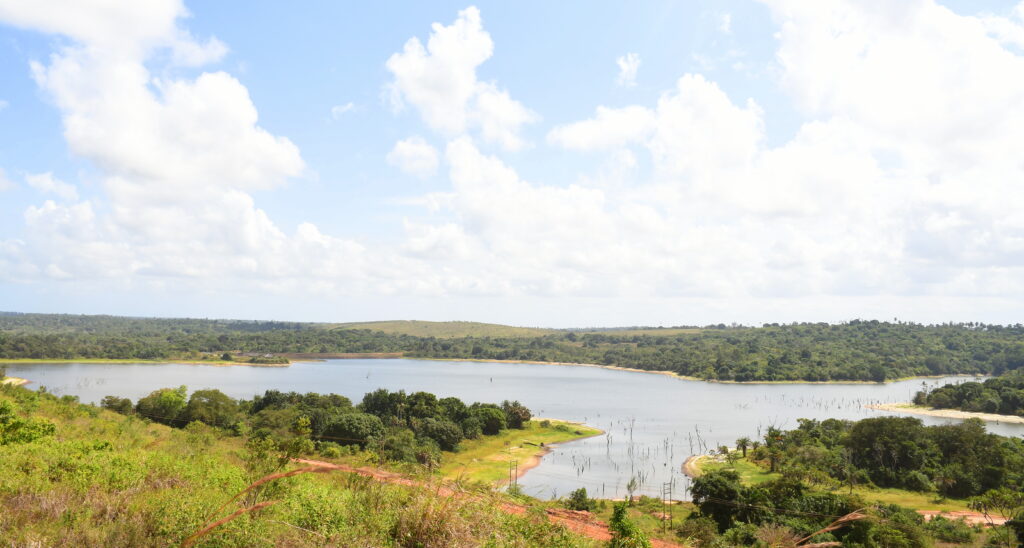Base-Titanium
Base Titanium, a locally based mining company, recently hosted media representatives at their Kwale Mine site for an extensive tour, offering a detailed insight into their operations to enhance understanding of the company’s processes, challenges and achievements as the mine faces closure due to the depletion of mineral resources.
The visit aimed to provide an opportunity for transparency and reflection on the impact of the project as it approaches its final phase. The tour showcased several key aspects of Base Titanium’s operations, starting with their indigenous tree nursery, which highlights their commitment to reforestation and environmental sustainability.
Base Titanium’s Kwale Mine commenced in 2011 and mining started on the Central Dune in October 2013. It is Kenya’s first Large-scale mining project and accounts for 65 percent of Kenya’s mineral Sector. Media representatives were given an in-depth look at the company’s mining activities and the rehabilitated areas, demonstrating the extensive post-mining efforts undertaken to restore the land to its natural state.
Speaking to the media representatives, Base Titanium’s External Affairs General Manager, Simon Wall, emphasized that although mining operations are set to conclude in December, the company’s presence will not end there. He pointed out that processing and transporting minerals will continue, along with significant environmental rehabilitation efforts that still need to be addressed.
These post-mining activities, he emphasized, ensure that the company remains engaged in the area, focusing on fulfilling its environmental and operational commitment.
Wall said that they are working with NITA as part of the plan to transition their staff away from employment with Base Titanium on the recognition of the prior learning program. He noted that this is an opportunity where most of their employees worked at the mine site and never had any formal training and certification.
He also spoke about Base Titanium’s obligation to pay royalties directly to the National Government through the Ministry of Mining which they did on a monthly basis. Of the total royalties, 70 percent is retained by the National Government, 20 percent is allocated to the County Government, and 10 percent is directed to the local community.

The Muk dam, one of the rehabilitated sections in the Southern Dune within the precincts of Mining Firm Base Titanium.
He said that they are still having conversations with the Government regarding compensation on the permanent infrastructure like power lines, dam and the sub stations. Building the mine cost 26 billion in investment, 9 of which was spent on local content, 3.7 invested in social infrastructure, livelihood enhancement, health and education.
“As much as Mining ends in December, we still need a year or two to complete our rehabilitation process,” Wall said.
Regarding staff redundancy, he noted that while not many employees have been affected at this stage, the process will begin in earnest at the end of December. The redundancy will occur in 2-3 phases, with the first major phase taking place in late December, followed by another in March, and the final phase in June.
Base Titanium has created over 1600 direct jobs, 1430 indirect jobs in the supply chain and 1380 induced jobs through consumer spending. Base Titanium’s Environment Manager, Nick Okello, stated that they are actively working on rehabilitation efforts while closely monitoring key environmental factors. These include air and water quality, radiation levels, and waste management, ensuring that all aspects meet the necessary standards.
He said that they have rehabilitated more than 500 hectares in the southern dune, 250 in the central dune and 250 in the Northern Dune. Okello highlighted that the company employs two methods of rehabilitation. First they carry out land shaping to ensure proper drainage that aligns with the natural water flow leading to the surrounding community.
“After shaping, we apply top soil and assess which nutrients are lacking in the soil to determine the appropriate supplementation. The rehabilitation process begins by planting grass as a pioneer species, followed by shrubs and trees,” Okello said.
He assured that over the 5 to 10 years, these efforts are expected to restore the land to a state comparable to the nearby biodiversity as they did on the central dune.
The tour also included visits to several community projects that Base Titanium has implemented in partnership with the CDAC Committees. Among these were the Chigombero Early Childhood Development (ECDE) center and the newly constructed dormitories at Msambweni Boys Secondary School.
These initiatives demonstrate the company’s ongoing commitment to supporting local communities through education and infrastructure development, fostering long-term social impact beyond their mining operations.